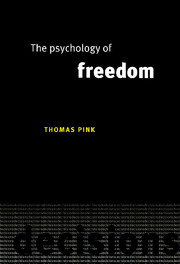Book contents
- Frontmatter
- Contents
- Acknowledgments
- Introduction
- 1 Agency and the will
- 2 Scepticism about second-order agency
- 3 Decision-making and freedom
- 4 The Psychologising conception of freedom
- 5 Decision rationality and action rationality
- 6 Decision-making and Teleology
- 7 The Regress argument
- 8 In defence of the Action model
- 9 The special-purpose agency of the will
- Conclusion
- Bibliography
- Index
1 - Agency and the will
Published online by Cambridge University Press: 31 August 2009
- Frontmatter
- Contents
- Acknowledgments
- Introduction
- 1 Agency and the will
- 2 Scepticism about second-order agency
- 3 Decision-making and freedom
- 4 The Psychologising conception of freedom
- 5 Decision rationality and action rationality
- 6 Decision-making and Teleology
- 7 The Regress argument
- 8 In defence of the Action model
- 9 The special-purpose agency of the will
- Conclusion
- Bibliography
- Index
Summary
ACTIONS AND PURPOSES
Action is purposive, Whenever someone deliberately performs an action, they are doing something in order to attain some end. The end's attainment might be caused by the action – as when a doctor gives his patient medicine in order to cure him. But the end's attainment might also be constituted, either in part or in whole, by the action's performance. I might be performing an action simply for its own sake. When I twiddle my fingers, the relevant end might simply be that my fingers be twiddled.
Purposiveness is a salient characteristic of action. It is part of what makes our action seem so distinctively active, rather than passive – so distinctively something which we do, as opposed to something which happens to us. To do something as a means to an end is, at the very least, to do something. So what makes action purposive? What makes it true that I am performing some action A purposively, as a means to an end E?
There is a familiar answer to this question. The purposiveness of action is constituted, at least in part, by the psychological states or attitudes which cause and explain it. These attitudes are desires and beliefs which constitute the agent's reasons for the action's performance. They are desires and beliefs which rationalise the action.
Any action is going to be explained and rationalised by some desire to perform it. To be motivated to perform an action A, an agent must want to do A at least as much as he wants to perform any other option available to him.
- Type
- Chapter
- Information
- The Psychology of Freedom , pp. 14 - 32Publisher: Cambridge University PressPrint publication year: 1996



